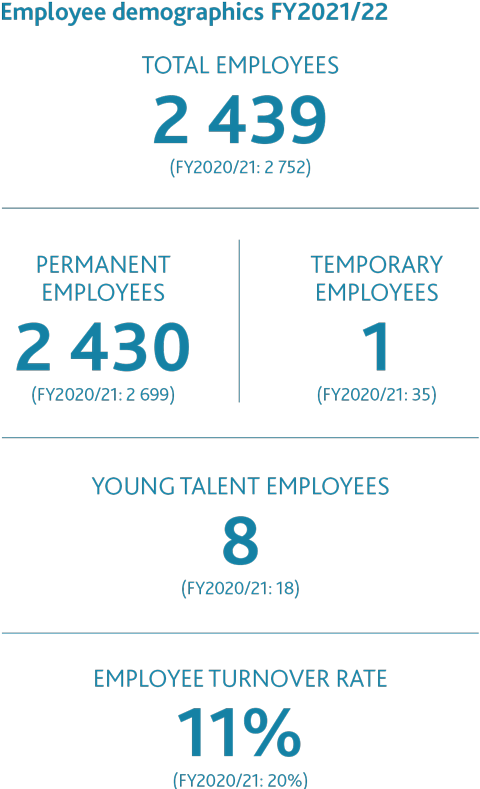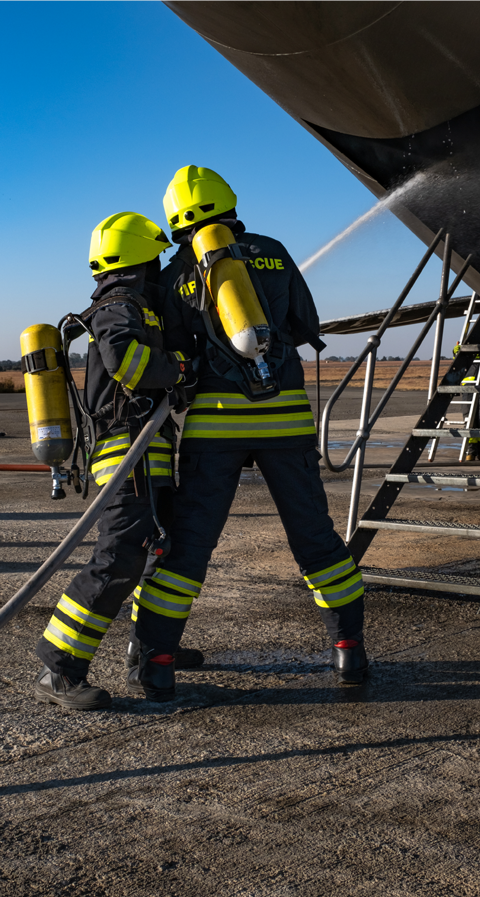TRANSFORMING OUR PEOPLE
While our ability to meet the internal transformation objectives originally defined in our Strategy 2025 was curtailed by the pandemic, we have adapted to changing conditions and a new People and Culture Strategy with realistic short- and medium-term transformation objectives was approved by the Board during the reporting period.
Human Resources also led the process of developing our Revised Governance Framework and Operating Model to take new realities into account. These were developed in order to enable us to become a leaner and more agile organisation without having to compromise our transformation agenda.
MANAGEMENT CONTROL
The appointment of a new CEO and CFO in the first half of 2020 brought stability to the Company at a crucial time. The new executives and the other members of the Board have provided strong and consistent leadership throughout what has been the most challenging period in our business’s history. They have been supported by the Group’s Executive Committee and the Management Committees in all of the operating units.
No new Board members were appointed during the reporting period, but two Board members retired at the 2021 Annual General Meeting and black representation at Board level has therefore been reduced.
EMPLOYMENT EQUITY
Budget constraints during the past two periods meant that we had to put new appointments on hold and delay the implementation of certain company-wide initiatives to enhance employment equity. For example, the development of our successive employment equity plan, which was scheduled to take place in 2020, had to be delayed until the start of the 2021 financial year. The process of consulting with employees and setting new transformation targets is, however, now back on track.
EMPLOYEE DEMOGRAPHICS
We remain committed to developing a workforce that is representative of the demographics of the
economically active population of South Africa. Consequently, during the reporting period, black representation increased by 0.6% and black female representation increased by 1%. Although these proportional increases were positive, absolute numbers decreased due to the staff reduction initiative undertaken in response to the impact of the pandemic.
Total female representation in the workforce increased by 0.6% to 47.8% of the Company’s total of 2 439 employees. This is a proportional year-on-year improvement compared to the national economically active population for females of 44.6% but must also be considered in light of the reduction in the total number of employees.
Supporting persons with disabilities also remains a key focus in transforming our people. The representation of people with disabilities was maintained at 2.1% of our total workforce during the reporting period, of which 1.9% were black persons with disabilities and 0.9% were black female persons with disabilities.
While our efforts to assess reasonable accommodation requirements for employees with disabilities, which was initiated in 2019, had to be put on hold in 2020, routine support activities continued throughout the reporting period. The persons with disability network support group meetings continued to be held on a quarterly basis throughout the year, although some employees were unable to attend virtually during strict lockdown periods as they did not have access to a computer and/or an internet connection.
As we do every year, we also celebrated Disability Day in December 2021 and continued to raise awareness of the needs of people with disabilities using communications elements such as screensavers and email awareness campaigns.

SKILLS DEVELOPMENT
In the area of skills development, young people between the ages of 18 and 35 continue to be a primary focus for us, although access to skills development and further education and training is available to all employees.
While the realities of budget constraints continued to be felt throughout the reporting period, we concentrated on developing our Training Academy by forming strategic partnerships with key providers and by building internal capacity. With our business focus diversifying and shifting to concentrate on building non-aeronautical revenue in the wake of the pandemic, we recognise what a critical role the Academy has to play in capacitating our organisation for future sustainability and success.
At senior management and executive level, five ACSA candidates were accepted into the TETA/GIBS International Executive Development Programme for Women in 2020 and, while the international module had to be suspended later that year, it was resumed in 2021 and three of the five candidates were able to complete the programme. In June 2021, five additional candidates were accepted for the 2021 programme.
In addition, five of our most promising black female airport managers participated in the 2021 Women in Power Programme, which is run by the Black Management Forum in partnership with Duke Corporate Education. Not only did this give the candidates the opportunity to participate in this important programme, it gave us as a business the opportunity to showcase our gender equality capabilities while also driving our overall transformation agenda. It has also set a solid foundation for the roll-out of many other gender and women empowerment initiatives in the future, as allowed for in our Employment Equity Plan.
Further, we continued to maintain our commitment to providing bursaries in specific areas of study for qualifying employees and their children.
For example, we offer the children of employees in Grades A, B and C bursaries to pursue studies in subject areas identified on the National Scarce Skills List. A scarcity of skills has been identified in over 100 critical trades and professions, including engineering, finance, geology, carpentry, diesel mechanics, tool and dye making, ship rigging, logistics, production, operations, and computer networking, among others. Apart from providing bursaries for formal education and training, the programme also allows for workplace exposure through vacation work.
In the 2022 financial year, we awarded bursaries to 83 employees to the value of R1.8 million. Further information on bursary scheme recipients is available in our Performance Review.







